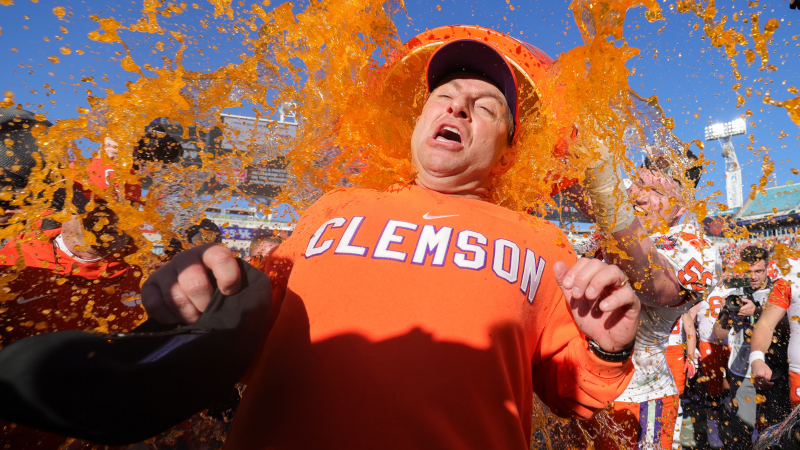Tech company Catapult says NCAA looking at claims of security breach of football videos
LOS ANGELES — When Rose Bowl week began, nobody could have anticipated that an Australian sports technology company named Catapult would become a key player in the pregame drama.
It began on Thursday, when Alabama’s players let something slip that was not likely intended for public consumption: Heading into the College Football Playoff semifinals against Michigan, players were not allowed to review practice film on their individual iPads because of security concerns related to the server where Catapult stores and distributes the footage.
Alabama’s players suggested that the concerns were related to the Michigan sign-stealing scandal that captured the nation’s attention earlier this season.
The next twist came on Friday morning, when Michigan players said they had also stopped getting film to players individually through Catapult but had actually made the change in November.
“Just caught wind of things that could be going on,” Michigan offensive coordinator Sherrone Moore said. “And just told our kids, hey, we’re not watching stuff on the iPads anymore. Watch it in-house and handle it that way.”
If that wasn’t intriguing enough, Catapult then issued a statement that was first obtained by For The Win and then distributed to other media outlets, raising the specter of NCAA and police involvement.
“We are aware of the ongoing investigation of the alleged unauthorized access to NCAA football video footage,” the statement read. “We have conducted an internal investigation and have not found any security breach in our systems. We have shared this with local authorities that are conducting an investigation. We will continue to support the ongoing investigation with the NCAA and local authorities. At Catapult, we hold ourselves to the highest standards and safeguarding customer information is of utmost importance to us.”
Yahoo! Sports subsequently reported, according to unnamed sources, that the investigation is centered on “at least one other school” but not Michigan.
Much of this story is still vague and developing, but here’s what we know so far.
Why is Catapult important?
Founded in 2006, Catapult has become a worldwide company that provides performance-monitoring data and video analysis across a variety of sports. Among the high-profile clients they advertise on their website are the Kansas City Chiefs, Golden State Warriors, Duke, UConn and a number of European soccer clubs like Paris Saint-Germain and Manchester City.
Catapult does not advertise how many college football programs use its service, but it is known to be widespread. The big benefit is that players can watch the film of every practice on their own time.
CHEATING IN SPORTS:Why is playing by the rules so hard?
“At home, if I’m chilling or getting some recovery in, I pop on some film and do 30 minutes at a time, 45 minutes at a time, whatever it might be,” Alabama offensive tackle JC Latham said.
Now, apparently both Michigan and Alabama are instead reviewing the film within the building instead of having it sent to iPads so that it’s not stored on the server and potentially hack-able.
Why is everybody so paranoid?
Well, college coaches are paranoid about secrets getting out and have become increasingly more worried about espionage over the years.
There was actually a nugget from an ESPN all-access piece in 2016 detailing how some apartment complexes near Alabama’s campus had balconies with a view of the practice field. One of the complexes had actually written into leases that people who rented certain apartments were not allowed to be outside watching practice.
That’s how seriously some coaches take the threat of opposing teams spying on their practices. It’s not just a college football issue, either. Recently, USA TODAY Sports did a story as part of a 10-part series about cheating in sports that focused on college basketball and the long history of coaches being worried that their shootarounds at road venues were being monitored by secret cameras.
Of course, the Michigan sign-stealing scandal only heightened those suspicions — especially when it comes to Michigan. Though Connor Stalions hasn’t been part of the program since the allegations first became public in October, it makes sense that Alabama would take every precaution.
It’s worth noting that unsubstantiated rumors of hacking to gain information — directed not just at Michigan but several other programs — have been floating around the college football world and internet message boards for several weeks.
It’s unclear whether there’s anything to it, or whether everyone is being overly cautious based on innuendo. And it’s worth noting once again that Catapult says there’s no evidence of a data breach in its system. We’ll have to wait and see what, if anything, the local authorities and/or the NCAA eventually find in their investigations.
MORE:Secret filming in sports isn't limited to football. It's just hard to prove.
Does any of this matter?
A good old spy scandal always gets people going, but the reality is that this will have no impact on the Rose Bowl or any other postseason game. Privacy is always at the top of mind for college football teams, and nobody would have known about any of this drama if not for some Alabama players being honest when asked by reporters if they were doing anything differently in their preparation due to the Michigan sign-stealing scandal.
What it does highlight, though, is that teams do need to be careful when putting proprietary information like game plans and practice film on a server that might be compromised either through illegal means like hacking or just somebody sharing a password.
Keep in mind, players are constantly coming in and out of programs now — even at this time of year — due to the transfer portal.

Disclaimer: The copyright of this article belongs to the original author. Reposting this article is solely for the purpose of information dissemination and does not constitute any investment advice. If there is any infringement, please contact us immediately. We will make corrections or deletions as necessary. Thank you.







